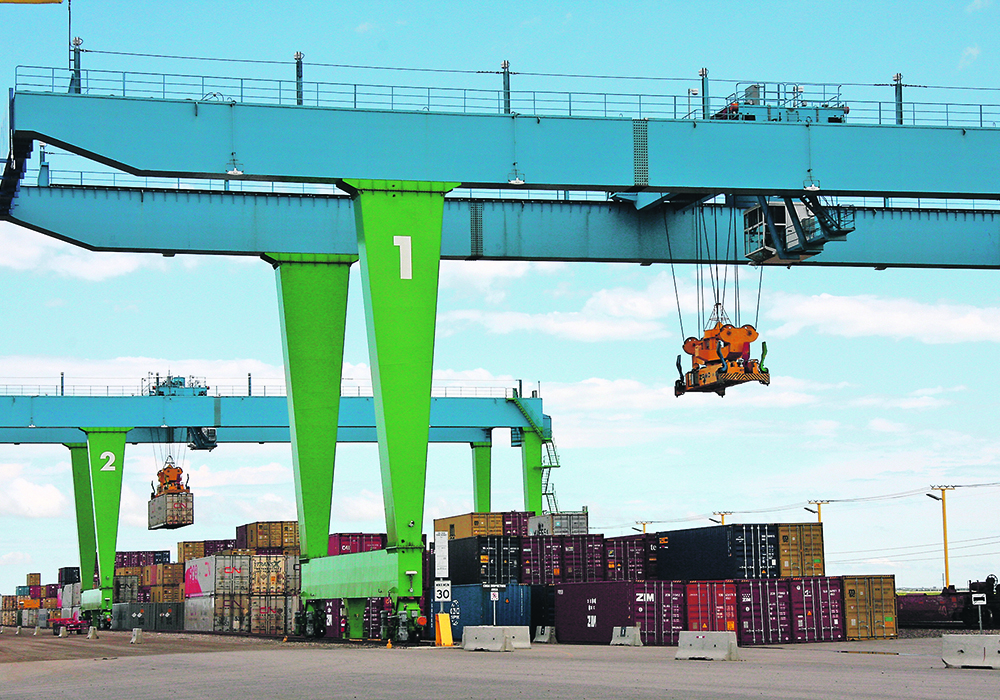The $18.3 million that Transport Canada has announced for the province’s short-line system is expected to improve efficiencies
Investments in Saskatchewan’s short-line railway system announced last week are expected to improve efficiency and create a more fluid supply chain.
Federal transport minister Omar Alghabra announced $18.3 million in spending on four projects through the National Trade Corridors Fund. The private sector recipients are also contributing.
The federal investments include $13.5 million for grade stabilization and two Saskatchewan grain-handling facilities along Big Sky Rail and Last Mountain Railway, $2.2 million for 12,000 feet of additional track at Purely Canada Foods in Lajord, Sask., and $1.6 million for Great Western Railway to build a pre-interchange yard at its interchange with Canadian Pacific Railway near Assiniboia, Sask.
Read Also

Saskatchewan throne speech promises strong economy
Saskatchewan’s legislative agenda for the coming year will focus on meeting the challenges of new world trading relationships, said the speech from the throne.
The other $1 million goes to the City of Regina to help with preliminary design costs of relocating railroad crossings on Ring Road.
“Canadians are worried about affordability and rising inflation,” Alghabra said at a news conference at Intermobil, the intermodal terminal along Regina’s east side. “Their government is working to ease pressure on our supply chain. I want them to be confident that the essential goods that they need will be there on time.”
Murad Al-Katib, president of AGT Food and Ingredients, which owns the terminal, Big Sky Rail and Last Mountain Railway, said trade flows have been dramatically impacted by the pandemic, the war in Ukraine and the resulting economic uncertainty.
“When you’re landlocked thousands of kilometres from tidewater and ports, you’re dependent on rail and road infrastructure to get your product to market,” he said.
The $27-million project on Big Sky and Last Mountain involves tie replacement on about 50 kilometres of track near Eston and the construction of two grain-handling facilities. One of those at Condie, just outside Regina, is already complete with 3,500 tonnes of new storage and a track expansion, said Al-Katib.
Another at Dinsmore, Sask., is in the works, as well as possibly a third near Girvin, Sask.
Al-Katib said these fit with the $65-million investment announced a year ago at Delisle and speed up collection programs.
“It’s a very critical project for us, and the federal government National Trade Corridors (Fund) just accelerates the timeline by probably three to four years,” he said.
Purely Canada Foods chief executive officer Tyler West said a $6.5-million project already underway at its terminal in Lajord will improve flow by adding track.
“We’re putting a two-kilometre addition of brand-new built track into our headquarters in Lajord,” he said. “That will allow for bigger unit trains, the new 135-car unit trains, and allow for different sizes of shipments both inbound and outbound.”
He said the company, which partners with a large grain operation, brings in products such as fertilizer, while shipping grain and ingredients out.
The company owns its sidings at the site where Stewart Southern Rail and CP have an interchange.
West said he appreciates the federal government’s recognition of short-line railways.
“The fund on this call was aimed at decreasing bottlenecks and increasing flows and efficiencies. That’s exactly what all the projects that were awarded will do,” he said.
Andrew Glastetter, general manager of Great Western Railway, said Transport Canada has taken more interest in short lines in the last few years.
“They’re always out asking questions, they visit us, and they learn and they’re realizing, wow, short lines originate 20 percent of traffic across Canada. We handle over $5 billion worth of freight so we’re a pretty significant part of the supply chain,” he said.
The $3.2-million pre-interchange will be built about eight km west of Assiniboia where GWR intersects with CP. Three tracks will form a mini-railyard, Glastetter said, which will alleviate congestion.
Trains can be built at the new yard and then once they arrive at the interchange can be handed off, he said.
“The current model would often require us to bring in 150 cars, split them up into three or four different tracks, and put them all back together again,” he said.
As GWR moves more into aggregates and fertilizer, it needs to be more efficient. He added the company also wants to attract a large percentage of what it believes is more than 400,000 tonnes of high-quality Canadian durum currently going south through a terminal served by an American railway.
“It’s not touching the Canadian freight system or the Canadian port system at all, and we see that as opportunity and the more efficient we can be to handle the unit train volumes and improve the interchange, that’s going to give us a better opportunity to go after that traffic.
The project is at the final signing stage and some work should be done this summer, with full operation expected by the end of August 2023.
Glastetter also said he would like to see more federal funding aimed at short lines, perhaps allocated to ongoing maintenance.
Al-Katib said the NTCF allows the transportation and logistics sector to plan for the next 10 to 50 years rather than just in four-year election cycles.
The City of Regina funding will help with the flow of canola and products in and out of the proposed new crush and biodiesel plants. Al-Katib said with 10 to 15 million more tonnes of production expected over the next decade, supply chain improvements are critical.
“The improvement of the short-line infrastructures in this province are going to be key to us realizing billions of dollars of new economic benefits over the next decade,” he said.
“We need to encourage the ability to put commodities in pipes that belong in pipes and commodities like grain and potash on rail that belong on rail.”
















